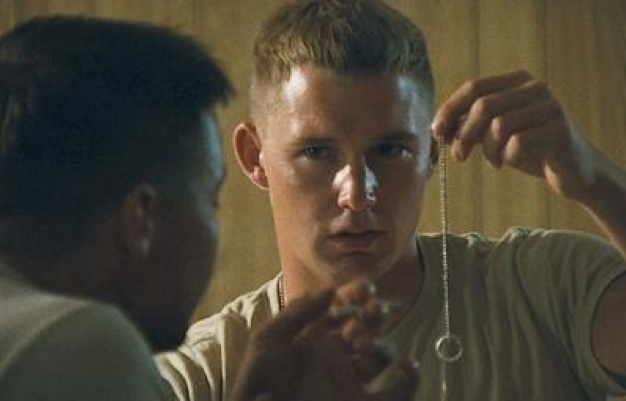"A Different Kind of War Film: The Ethos of the Individual Soldier in The Hurt Locker"
|
Mikal LambdinMikal has a BA in English with a concentration in Writing and Rhetoric from George Mason University. She most recently worked as an Undergraduate Research Assistant for Writing Across the Curriculum, where she wrote research-driven blog posts about composition from a student perspective. She enjoys pushing the envelope when writing by creating her own rhetorical frames and finding connections between dissimilar topics like children’s literature and politics. Mikal lives in Arlington, Virginia, with her doctor-to-be husband and hyperactive cat. Contents"I Don't Know": Leaving Things Out "I Don't Know": Leaving Things Out Cont. "I Wanna Die Comfortable": War is a Game "I Wanna Die Comfortable": War is a Game Cont. "With Me I Think It's One": Man Over Machine |
"I Don't Know": Leaving Things OutThroughout the film, James has many opportunities to bare his soul in true Hollywood fashion. Several scenes seem targeted as moments of reveal, promising to answer weighty questions about James’s hidden thoughts and experiences, only to leave these questions unanswered. This technique may be perceived as a little risky, as it results in some anticlimactic moments where audiences expect to discover James’s secrets and are ultimately disappointed. However, the anonymous nature of his character is a powerful rhetorical tool that increases his ethos by making him complex and believable. The moment of reveal is a common film cliché, depicted in Saving Private Ryan when the character of Captain Miller suddenly discloses his long-secret former occupation as an English teacher just in time to resolve a heated fight amongst his squad. Contrary to this oft-used cliché, James does not open his heart at precisely the right moment, at once finding the perfect words to express his thoughts and feelings. He is guarded and awkward and rarely wants to reveal himself, even when he knows how. He disappoints audiences, but this disappointment is not an unfortunate byproduct of the rhetorical approach – it is necessary. The viewers’ disenchantment itself sends an important message: James is not a hero or the model soldier; he is just a person. James’s anonymity is on display in a scene toward the middle of the film, when fellow soldier Sergeant JT Sanborn finds a box of his possessions. The conversation quickly turns to his son and wife, but James offers little information: SANBORN. [looking at a photo] Who’s that? JAMES. That's my son. He's a tough little bastard. Nothing like me. SANBORN. You mean to tell me you’re married? JAMES. Well, you know, I had a girlfriend and, uh, she got pregnant. So we got married, we got divorced. Or, you know, I thought we got divorced. I mean, she's still living in the house and she says we're still together, so I... I don't know. Wha-what does that make her? I don't know...  Here, James fumbles, contradicts himself, and hesitates repeatedly as he avoids revealing details about his familial relationships. He first describes his son as a “tough little bastard,” making him “Nothing like” James, a statement which is pointedly contradictory. ‘Tough bastard" is a fitting description of James, the experienced, war-hardened soldier who has disarmed 873 bombs without blinking an eye. By giving his dissociated son a description that better fits himself, James avoids confronting both his fellow soldiers and the audience with his true identity. He then becomes increasingly uncomfortable when asked about his marriage.  James pauses uneasily before answering, and when he finally does, his speech is peppered with detracting phrases, including “uh,” “you know,” “I mean,” and “I don’t know.” There is hardly a breath between “we got married” and “we got divorced,” as if nothing occurred between the two events. Throughout the entire narration, James expresses a passive confusion, as if to suggest that he’s not really sure what happened: “I thought we got divorced. I mean, she's still living in the house…. Wha-what does that make her?” It soon becomes clear that James’s story is not a story at all. His repetition of “I don’t know” is perhaps emblematic of the whole scene – a weak attempt to feign ignorance about a complex and intimate part of his life. While he paints a picture of a family situation that he knows little about and has no control over, it is difficult to believe that this is actually the case. Regardless of what James is hiding, he is undoubtedly hiding something, and his mysterious relationships with his wife and son are never truly revealed. |